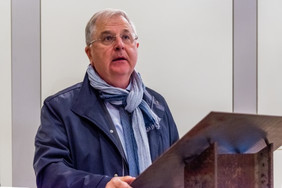They were refugees who were the first Jews to come to Franconia from the Rhenish cities at the end of the 11th century, fleeing the pogroms there at the beginning of the First Crusade. Here they experienced phases of toleration with exclusion and persecution.
Prof. Weiss not only spoke about the events, but also analyzed the background. Three motives guided the spiritual and secular sovereigns to temporarily tolerate the Jews in parallel societies: These "citizens" were sources of income (special taxes, letters of protection), Christian ethics obligated them to love their neighbors, and according to biblical tradition, Jews had to be Christians before the Last Judgment.
All too often, all these principles were ignored and motives for pogroms were invented on the basis of fake news: An unexplained corpse discovery in England was attributed to Jews who murdered the boy in order to use his blood for ritual purposes. This tall tale formed the basis of many pogroms for alleged crimes committed by Jews, including in Lower Franconia. Host sacrilege was another charge. Here the unbelievers were supposed to have cut up a host, i.e. the body of the Lord. A particularly explosive mixture arose where economic interests were combined with such lies. So in Lower Franconia, where the impoverished petty nobles in the persons of Rintfleisch and Armleder, together with the whipped-up mob, massacred hundreds of Jews in the villages. Of course, the non-Christians were also to blame for the plague, because they had poisoned the wells. Whereas in Würzburg the first accusation with corresponding consequences was made several years before the plague wave reached the city. The Chapel of the Virgin Mary was built on the site of the burned synagogue. A late, bloodless variant of the persecution is the expulsion from the bishopric and imperial cities, because the sovereigns wanted to have ethnically. and later also confessionally uniform subjects, which marks the birth of rural Judaism.
Prof. Wolfgang Weiss concluded his lecture: "The title of my lecture is 'Excluded, Persecuted, Killed'. These adjectives characterize the tragic history of the Jews in Christian Franconia in the Middle Ages. The events are undoubtedly terrible; but after the Enlightenment and the emancipation of the Jews in the 19th century, who could have expected that things could get even worse in the 20th century. Therefore, there can never be enough remembrance of what was, and never enough warning and admonition that it will never come again."
